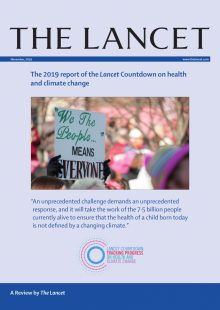Need all the detail? Download the Report
The full report is available free of charge at The Lancet. You will need to register for a free account but this takes only a minute and nothing else is required. Thank you.
Download NowTo deliver the best-available science the Lancet Countdown has developed an open, transparent, and rigorous process for the development and improvement of its indicators, data and methods. Read more about this process below.
The Lancet Countdown: Tracking Progress on Health and Climate Change
The Lancet Countdown publishes annual updates of over 40 indicators developed by our experts across five key areas:
To track these five key areas we draw on over 200 world-class experts from a range of disciplines, including health and epidemiology, climate science, engineering, agriculture, transports, economy, and social and political sciences.


Our Indicators
Our indicators span a range of disciplines and expertise. Each indicator in the Lancet Countdown’s assessment must:
The indicators must also be:
Strengthening Our Indicators
We are committed to continuously improving our indicators, ensuring we deploy the best-available science to track progress on health and climate change across the world. The Lancet Countdown’s report goes through two tiers of strict assessment processes:


Get involved
The Lancet Countdown is an open, collaborative research programme. We are committed to continuously improving our work, and ensuring our outputs reflect the best available science. We believe that the most relevant science is that which is driven by local researchers, familiar with their local context. To this end, we maintain an open approach, welcoming engagement with new academic partners globally with the expertise and capacity to make substantial contributions to our indicators, and other academic outputs. We invite direct input on the content, methods, and data of our current indicators and indicator domains.
If you would like to contribute to the Lancet Countdown’s annual indicator reports, either by developing new indicators, helping improve existing ones, or contributing to other academic work, please contact us at info@lancetcountdown.org. We particularly encourage and favour contributions of colleagues from low- and middle- Human Development Index (HDI) countries. We actively encourage input from minority ethnic candidates and disabled candidates who are currently underrepresented in academic research and institutions.
Need all the detail? Download the Report
Need all the detail? Download the Report
The full report is available free of charge at The Lancet. You will need to register for a free account but this takes only a minute and nothing else is required. Thank you.
Download Now